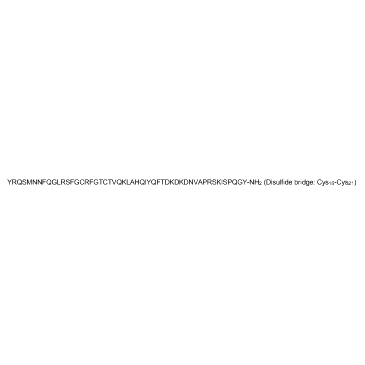肾上腺髓质素(1-52)(人类),三氟乙酸盐

肾上腺髓质素(1-52)(人类),三氟乙酸盐结构式

|
常用名 | 肾上腺髓质素(1-52)(人类),三氟乙酸盐 | 英文名 | Adrenomedullin (human) |
|---|---|---|---|---|
| CAS号 | 148498-78-6 | 分子量 | 6028.82 | |
| 密度 | N/A | 沸点 | N/A | |
| 分子式 | C264H406N80O77S3 | 熔点 | N/A | |
| MSDS | 美版 | 闪点 | N/A |
肾上腺髓质素(1-52)(人类),三氟乙酸盐用途Adrenomedullin (AM) (1-52), human 是一种含有 52 个氨基酸的多肽,影响癌细胞增殖和血管生成。 |
| 中文名 | 肾上腺髓质素(AM)(1-52),人 |
|---|---|
| 英文名 | Adrenomedullin (AM) (1-52), human |
| 描述 | Adrenomedullin (AM) (1-52), human 是一种含有 52 个氨基酸的多肽,影响癌细胞增殖和血管生成。 |
|---|---|
| 相关类别 | |
| 体外研究 | 为了探讨肾上腺髓质素(AM)(1-52),人类对星形胶质细胞的影响,CRT-MG细胞在肾上腺髓质素(AM)(1-52),人(ADM1-52)不存在或存在下孵育48 h在含有1%FBS的培养基中进行,并进行伤口愈合测定。与未处理的细胞相比,ADM1-52处理的细胞中迁移到伤口区域的细胞数量呈剂量依赖性显着增加[1]。 |
| 细胞实验 | 使用移液管尖端从培养板的底部刮下CRT-MG细胞以产生无细胞区域。用PBS洗涤细胞培养物以除去细胞碎片,然后与制瘤素M(OSM),肾上腺髓质素(AM)(1-52),人(ADM1-52;0.1μM和0.5μM)在1%FBS中孵育48小时。 DMEM。在刮擦控制后拍摄伤口区域。在刮伤后48小时计数迁移到初始伤口区域的细胞数[1]。 |
| 参考文献 |
| 分子式 | C264H406N80O77S3 |
|---|---|
| 分子量 | 6028.82 |
| 外观性状 | powder |
| 储存条件 | −20°C |
| 个人防护装备 | Eyeshields;Gloves;type N95 (US);type P1 (EN143) respirator filter |
|---|---|
| 危险品运输编码 | NONH for all modes of transport |
| WGK德国 | 3 |
| RTECS号 | AV6800000 |
|
Intermedin1-53 attenuates vascular smooth muscle cell calcification by inhibiting endoplasmic reticulum stress via cyclic adenosine monophosphate/protein kinase A pathway.
Exp. Biol. Med. (Maywood.) 238(10) , 1136-46, (2013) We previously reported that endoplasmic reticulum (ER) stress-mediated apoptosis participated in vascular calcification. Importantly, a novel paracrine/autocrine peptide intermedin1-53 (IMD1-53) in th... |
|
|
The effect of intermedin on angiotensin II and endothelin-1 induced ventricular myocyte hypertrophy in neonatal rat.
Clin. Lab. 59(5-6) , 589-96, (2013) Intermedin (IMD), a novel peptide related to calcitonin gene-related peptide (CGRP) and adrenomedullin (ADM), may have localized actions as a modulator of cardiac function. The aim of the study is to ... |
|
|
Effects of intermedin1-53 on myocardial fibrosis.
Acta Biochim. Biophys. Sin. (Shanghai) 45(2) , 141-8, (2013) Intermedin (IMD) is a member of the calcitonin/calcitonin gene-related peptide (CGRP) family and has similar or more potent cardiovascular actions than adrenomedullin (ADM) and any other CGRP. The aim... |


